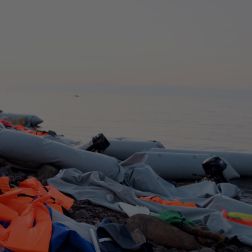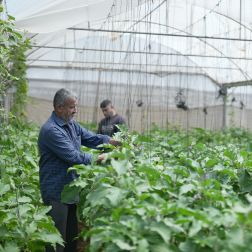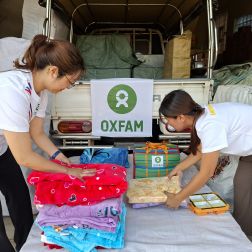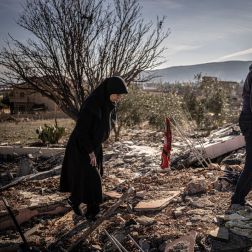- 6 mins read time
- Published: 2nd June 2021
Yemenis in Marib are running out of options
by Ruth James, Regional Humanitarian Coordinator - Middle East and North Africa
26th May 2021

“We are just waiting to die”
This is what Fatma* said when I met her in a displacement camp near Marib City, in Yemen. It was the third time she had been forced to flee since war broke out in Yemen six years ago. She arrived in this new camp just 27 days ago. Fatma was at a focus group discussion for displaced women.
143 such camps have sprung up in recent years around Marib. Each time there is an escalation in fighting, a new wave of people flee towards Marib and its surrounds, which now hosts over one million displaced people. More than 20,000 people have arrived in the last two months alone.
Why do they come?
Simply, they have nowhere else to go. Many have strong tribal links with people already living both in the city and the camps. Marib is Yemen’s oil and gas capital and all parties involved in this conflict have said publicly they will fight to the death for Marib.
This camp is in the heart of desert. It is battered by winds, floods and simmering heat. It is made up of makeshift shelters that people here say are not good enough even for their animals. The rainy season is just starting and Fatma says, “we will not be able to sleep soon because we will be in the water.”
When I say to the women it’s hot (it’s about 40 degrees), they laugh and say I should come back in two months. Then it will be really hot, they tell me.

In the last 27 days, they say they have received little support from anyone, except from a neighbouring IDP camp which has been there for a year. They rely on their neighbours for water, but there is hardly enough. Oxfam is planning to start providing assistance into this specific camp in the coming weeks.
Most of the women I speak to are widows. Their husbands have been killed either in the fighting, or when fleeing from the last IDP camp. They tell of shelling on civilian camps and say they do not feel safe. Gradually, they’re selling off their assets like livestock and jewellery in order to survive.
Most are not educated and, even if they could get a job, culturally it is not accepted and employment could put their safety at risk.
There is not a single latrine in this settlement of around 450 people. Women go into the desert in groups at sundown to use the bathroom. There are snakes out there. One woman in the group lost her hand after she was bitten. There are no menstrual hygiene materials so women either have to use dirty cloths, or nothing at all. They have no soap. They say their water is their most urgent need. Disease is widespread and there are no health clinics nearby.
Another woman, Hanan, showed me inside her shelter. It is 2.5m square. It sleeps her family of seven.
Violence continues unabated
Ramadan is supposed to be the peaceful month but conflict is intensifying in Marib by the day.
Recently workers for Oxfam’s local partner Benevolence Coalition for Humanitarian Relief (BCHR) were registering families in a camp to receive cash support. A missile landed about 100m away, injuring many and killing two women. Everyone in the camp was then moved to another, larger camp. This is the daily struggle people and humanitarian workers endure because of this unabated wretched war.
I spoke with Khadija, a mother of four, who fled after the missile landed in her camp. She told me that she had been forced to move three times already, and that over a year ago her husband disappeared in the fighting. She has no idea if he is alive or dead.
Khadija has no relatives to rely on for support. She says the cash Oxfam gave helped to buy food, nappies and formula for her baby.
I am neither on land nor in the sky, I don’t know if my husband is killed or still alive. I am I limbo.
What is Oxfam doing?
Oxfam and BCHR have provided life-saving cash to 1280 households in other camps and plan to start supporting the camp I visited soon. But this is just a drop in the ocean compared to what people in Marib need. It’s overwhelming. Their lives – and the work to support them – is further complicated by the fact that people have to keep moving as the conflict inches closer to them day-by-day.
We urgently need funding to provide for both those displaced and the communities that are hosting them, with clean water and sanitation, cash assistance to buy food and essential items such as soap, hygiene products, livelihood opportunities and access to basic services. The rainy season will start this month and their shelters will not be able to withstand the rain and wind. It is highly likely that cholera will increase.
Yemenis are running out of options, and unless the international community steps up support, many like Fatema and Khadija fear for their future.
Parties involved in this conflict must enforce a ceasefire now to save lives, and allow people to re-build.
Since July 2015, Oxfam has helped more than 3 million people in nine governorates of Yemen with clean water and sanitation, cash assistance and food vouchers, as well as gender and protection services – our supporters are central to this response. To date, we have reached over 35,000 people in Marib with life-saving aid, and we aim to reach many more. However, the best way of helping the people of Yemen is by implementing an immediate ceasefire and finding a peaceful solution to the conflict.
* Names have been changed




